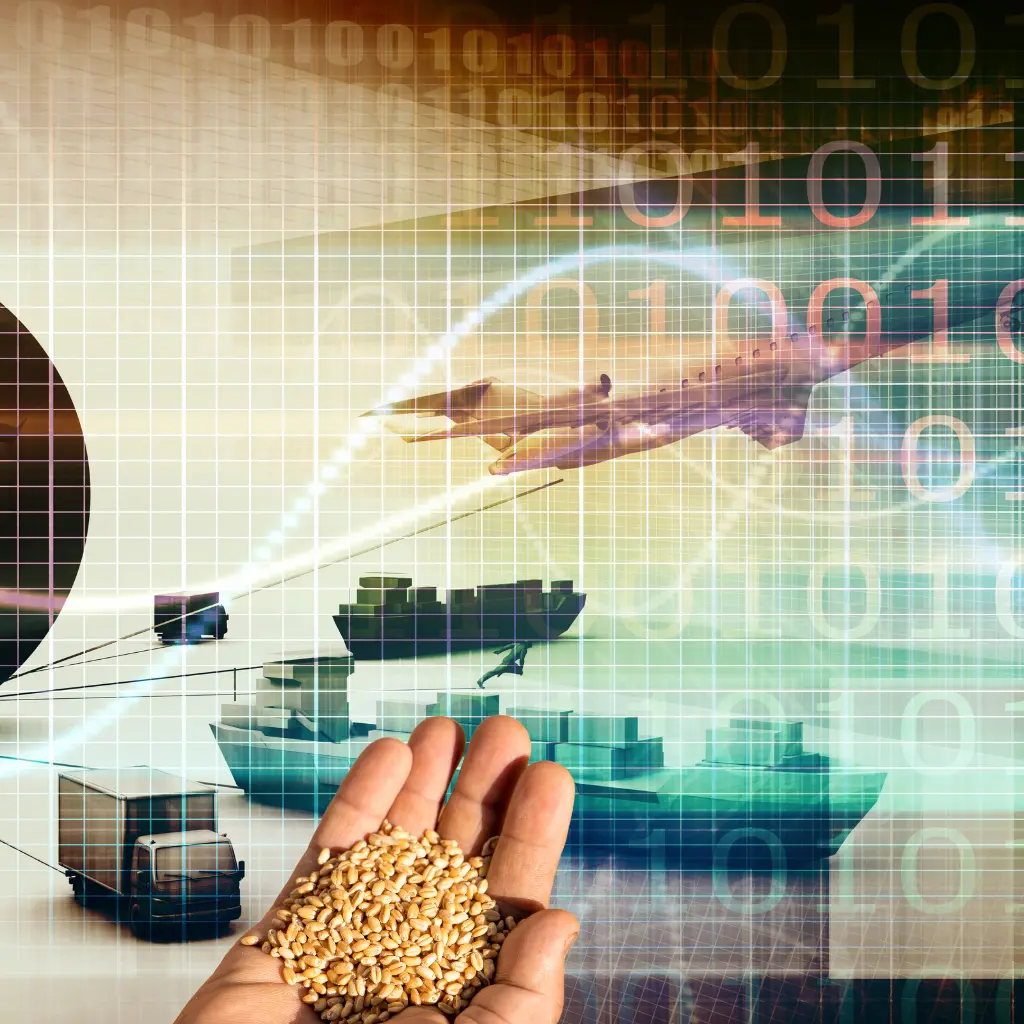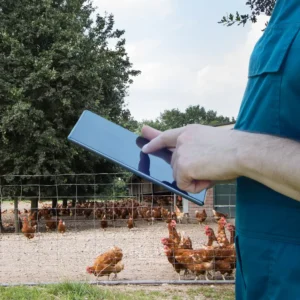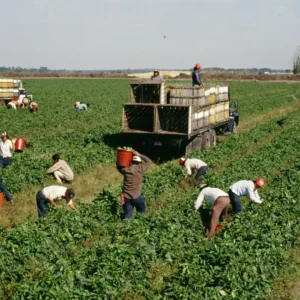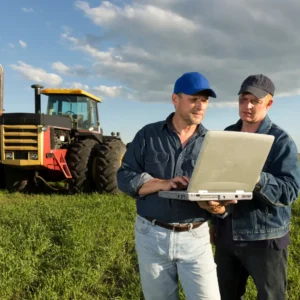
Cultivating Efficiency and Sustainability
AI in Agri Supply Chain
Technological advancements in the ever-evolving agricultural industry introduce novel solutions to longstanding problems. Artificial Intelligence (AI) is at the forefront of this transformation, particularly in Supply Chain Management.
Our article delves into how AI revolutionizes farm-to-market logistics, integrates predictive analytics into supply processes, implements AI-driven quality checks, enhances inventory management strategies, and offers accurate demand forecasting.
Join us as we navigate the dynamic role of AI in shaping future agri-business operations with a laser-focused approach to supply chain efficiency.
Table of Contents
Streamlining the Green Highway: AI in Farm-to-Market Transits
The advent of Artificial Intelligence (AI) helps streamline the process of farm-to-market transits— a significant component of green highways. AI solutions enhance logistics by predicting weather patterns, enabling efficient route planning and reducing fuel consumption.
They also empower producers and retailers with data insights on demand forecasting, minimizing food waste. Autonomous vehicles, IoT-enabled devices, and AI algorithms are combined to create more intelligent, greener supply chains.
This has dramatically reduced transit times and carbon footprints. Thus, embedding AI into this green highway can take us closer to sustainable agriculture, combating climate change, and achieving food security.
Supply Smart: Predictive Analytics in Agri-Logistics
Leveraging predictive analytics in agri-logistics has been a revolutionary stride, aiding farmers and suppliers in making informed decisions. By predicting future trends using historical data and AI technologies, predictive analytics provides insight into crop yields, optimal planting times, and probable pest invasions.
This helps schedule harvests and storage efficiently, minimizing waste and ensuring a consistent supply chain. Furthermore, accurately predicting demand and prices guides farmers regarding when and what to plant.
Thus, predictive analytics propels smart agriculture via practical, data-driven decisions, minimizing uncertainty and heightening productivity – benefiting suppliers, farmers, and consumers alike.
Quality at Every Step: AI-Driven Checks in Supply Chains
The utilization of artificial intelligence (AI) in supply chains improves quality at every step. AI-driven checks ensure goods are manufactured, packaged, transported, and dispatched appropriately.
AI-powered robots can conduct physical inspections, detecting errors or defects beyond human capacity. Machine learning algorithms help forecast demand more accurately, avoiding overproduction or shortages.
Furthermore, AI systems monitor operations to ensure compliance with regulations and safety standards. They also identify bottlenecks, enabling proactive problem-solving. By allowing real-time tracking, AI gives a transparent view of the supply chain, fortifying the much-needed trust among stakeholders.
Thus, AI plays a significant role in enhancing supply chain robustness and customer satisfaction.
From Silos to Systems: Smart Inventory Management with AI
Transitioning from silos to systems is a sizable step in intelligent inventory management, particularly with Artificial Intelligence (AI) integration. AI can centralize, streamline, and automate inventory management, bridging the disconnect between various departments.
It analyses past data to forecast future demand, ensuring optimal stock levels, reducing overstocks, and minimizing storage costs. AI can also enable real-time tracking, providing businesses with current inventory levels.
Additionally, AI systems can optimize the procurement process by determining the best time to reorder supplies based on various factors. Thus, AI’s intelligent, system-based approach replaces siloed processes, improving efficiency and profitability.
Fulfilling the Farm's Future: AI in Demand Forecasting
Fulfilling the Farm’s Future involves integrating AI into Demand Forecasting. Artificial Intelligence technologies have revolutionized agriculture by predicting future demands accurately and ensuring optimal resource utilization.
Such insights help farmers make informed decisions about what to produce, when, and in what quantity, reducing unnecessary surpluses and waste. Forecasting future demands need machine learning algorithms to scrutinize numerous data points, such as previous consumption habits, market trends, weather conditions, and socioeconomic factors.
This proactive approach helps set realistic objectives, improve supply chain management, and enhance agricultural productivity. Heavily data-driven AI in demand forecasting promises a sustainable future for farming.
Seamless Supply: AI's Role in Removing Chain Chinks
AI continues revolutionizing supply chain management by eliminating existing limitations and inefficiencies, often called ‘chain chinks’. Through machine learning and predictive analytics, AI tools can optimize distribution routes, enhance inventory management, and foresee potential disruptions in the supply chain.
This improves operational efficiency, cost savings, and superior customer service. Furthermore, AI’s role extends to automating manual tasks and decision-making processes, freeing time for human resources to focus on strategic tasks.
Therefore, moving towards a seamless, AI-powered supply system is becoming imperative for operational excellence and gaining a competitive edge.
Balancing Demand and Delivery with Data: AI in Agricultural Supply Chain Management
Balancing between demand and delivery effectively is a crucial part of any business. With data analytics, it has become easier to anticipate customer demands, optimize inventory management, and streamline operations.
Data provides valuable insights into customer behaviour, market trends, and product performance. It helps in forecasting future trends and making informed decisions accordingly. Furthermore, it enhances supply chain accuracy, reducing the risk of overproduction or stockouts.
As a result, businesses can maintain a healthy inventory level, increase customer satisfaction, and boost profitability. Thus, data is pivotal in striking the perfect balance between demand and delivery.
Storage Solutions: AI in Grain Storage and Management
Artificial Intelligence (AI) offers significant benefits in grain storage and management. It helps closely monitor the climatic conditions of storage facilities, ensuring the grains are well-preserved.
AI can sense shifts in humidity, temperature, and other crucial factors, enabling swift remedial measures to minimize losses. Moreover, using AI, companies can predict potential pest infestations or fungal growth that could damage the stored grains.
Such predictive analysis helps in early detection and prevention. AI also aids in inventory management, updating real-time information on grain levels in silos, and providing automated reports, enhancing efficiency and accuracy.
Ensuring Freshness: AI's Watchful Eye on Produce Quality
AI’s proficiency in assessing produce quality is revolutionizing the agricultural sector. With elaborate algorithms and machine learning, agricultural AI technology analyzes and ensures the freshness of the fruits, vegetables, and other farmed products from the field to the consumers’ plates.
It employs computer vision to detect visible defects, determine ripeness, and predict shelf-life and the overall quality of the produce.
This innovative technology is helping farmers prevent crop waste and allowing retailers to maintain optimal stock levels. Consequently, AI offers commercial advantages and contributes to global food sustainability by reducing food waste.
End-to-End Excellence: AI's Comprehensive View of the Agri-Supply Chain
The power of AI lies in its ability to comprehensively view and analyze the entirety of the agri-supply chain, making it invaluable for ensuring its end-to-end excellence. Using sophisticated algorithms, AI can predict weather patterns, assess soil health, manage pest threats, and even aid in harvesting operations, optimizing the production process.
Additionally, in logistics, AI can help in real-time tracking of produce, predicting transport conditions, and minimizing wastage. Within the retail sector, AI algorithms can assess consumer demands, optimize stock and reduce food waste. Thus, through its holistic approach, AI revolutionizes the chain from seed to store.
Conclusion
As the global demand for food continues to rise, the role of AI in agricultural supply chain management becomes increasingly pivotal. The marriage of data-driven insights, predictive analytics, and intelligent decision-making is enhancing productivity, minimizing waste and fostering a more resilient and adaptable food ecosystem.
By embracing AI with careful consideration for inclusivity and collaboration, the agricultural industry can cultivate a more efficient, sustainable, and secure future for generations to come.
Related Articles
- AI in Smart Agriculture – Precision Farming
- AI in Modern Aquaculture – Underwater Harvest
- AI in Animal Farming – Tech Meets Livestock
- AI in Sustainable Agriculture – Green Gains
- AI in Agricultural Supply Chain – From Farm to Table
- AI in Agricultural Biotechnology – Bespoke Crops
- AI in Agri-Finance and Insurance – Safeguarding the Harvest
- AI in Farming Tools and Machinery – Equipped for the Future
- The AI Urban Farming Revolution – Cultivating Cities
- AI in Agricultural Automation – Robotic Revolution
- AI in Post-Harvest Care – Beyond the Harvest
- The Surge of Agri-Tech AI Platforms – Digital Farming
- AI in Combatting Crop Diseases – Healthy Harvests
- AI in Boosting Organic Farming – Natural Nurturing
- AI in Precision Agriculture: Farms for a Sustainable Future
- AI in Crop Forecasting and Analysis: New Agricultural Era
- The Role of AI in Agricultural Robotics: Revolutionizing Farming
- AI in Smart Greenhouses: Revolutionizing Sustainable Agriculture

Arindam Roy
An Automation Consultant with 25+ years of IT Experience
Forbes Articles related to AI usage in the Agriculture Sector:





















